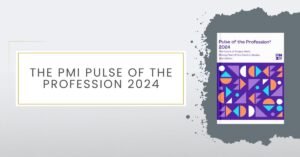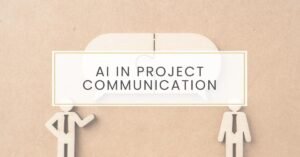The world of project management is undergoing a profound transformation, shaped by technological advancements, global changes, and the ever-evolving landscape of work.
The project management trends in 2024 show an important year to the profession.
Before we just jump for a new year to our careers, it’s imperative for project managers to not only reflect on the current state of their profession but also anticipate and prepare for the trends that will shape the future.
This blog post explores the challenges and opportunities that lie ahead for project managers, delving into the integration of artificial intelligence, the revolutionary changes in 2024, and the key project management trends that will define project management in the coming years.
Project Management Trends for a Career in the Age of Artificial Intelligence
The ever-accelerating era of artificial intelligence (AI) has thrust us into a new realm.
Automation, machine learning, and AI-driven analytics are now fundamental to project management processes.
While these advancements offer promising efficiency, they also present a set of unique challenges that demand our attention and strategic insightfulness. In this fast-evolving landscape, the integration of AI tools into our workflows is paramount.
We’re tasked with ensuring a seamless fusion that boosts productivity without compromising the indispensable human touch that defines effective project management.
As I reflect on our journey, I can’t help but underscore the increasing importance of soft skills.
Emotional intelligence and communication are taking centre stage as we find ourselves at the helm of teams comprising both human and machine elements.
Successfully leading in this nuanced environment requires a delicate balance of technological proficiency and interpersonal finesse.
In essence, as project managers, we stand at the intersection of cutting-edge technology and timeless leadership principles.
The challenge lies in not just navigating this intersection, but in mastering the art of harmonizing the advancements of the AI era with the enduring essence of human connection within our teams.
Challenges of 2024: A Year of Revolutions
As we all know, being a project manager means we need to be good with tech, leadership, and be cool with changes.
Now, with the rise of artificial intelligence (AI), things are getting even more interesting.
Automation, machine learning, and AI analytics are big parts of how we do things in project management now.
As we deal with all these changes, the big challenge for the project management trends is making AI tools work smoothly in our projects. We’ve got to find the sweet spot – using tech to make things better while keeping that personal touch that’s so important for good project management.
When I look back on our journey, it’s clear that soft skills are getting more significant. Leading teams with both people and machines means being smart about emotions and talking things out.
In this ever-changing world, using AI is a bit tricky. We’re not just project managers; we’re like conductors, blending tech skills with the significant human side of teamwork. To do well in this mix, we need to be smart and skilful together with the other project management trends.
How we handle this combo will shape how our projects go and, in the end, our careers. So, let’s face the challenges, sharpen our skills, and together, make our profession even better!
Remote Project Management Trends
The Project Management Institute (PMI) acknowledges the shift to remote work and highlights its impact on project management in the PMI Pulse of the Profession® report.
Based on the data from a two-year study by Great Place to Work that examined the responses from over 800,000 employees at Fortune 500 companies, most people experienced stable or increased productivity levels after shifting to work from home.
In 2021, Owl Labs reported that 90% of employees said they were as productive or more productive working remotely when compared to in-office work.
Additionally, the data from 2022 indicates that 67% of hybrid workers, who participate in both in-office and remote work, feel more productive when working from home.
Remote work is no longer a temporary adaptation, but a fundamental shift in how teams operate globally. Project managers need to hone their skills in leading and coordinating remote teams, leveraging collaborative tools, and ensuring effective communication across virtual spaces.
In the realm of remote project management, adapting to the fundamental shift towards remote work is crucial.
Focus on honing your skills in leading and coordinating remote teams, utilizing collaborative tools, and ensuring effective communication across virtual spaces.
Embrace the permanence of remote work, acknowledging its impact on project management, and actively seek ways to optimize productivity and collaboration within virtual teams.
Integration of Artificial Intelligence (AI) and Automation
Gartner predicts that by 2025, 40% of project management tasks will be automated, increasing efficiency and reducing errors.
AI tools and automation technologies are becoming essential for project managers. Familiarity with AI applications for data analysis, risk assessment, and predictive modelling will be a key differentiator in optimizing project processes and outcomes.
The state of AI in 2023 by McKinsey shows that One-third of respondents state that their organizations regularly use generative AI in at least one function.
This implies that 60% of organizations with AI adoption are utilizing generative AI.
Additionally, 40% of those with AI adoption anticipate increased overall AI investment due to generative AI, with 28% already having generative AI on their board’s agenda.
The primary business functions incorporating these tools align with commonly used AI areas: marketing, sales, product development, and service operations like customer care.
This suggests a strategic focus on high-value areas, as previous research indicated that these functions have the potential to deliver approximately 75% of the total annual value from generative AI use cases.
As artificial intelligence and automation become integral to project management, staying ahead involves familiarizing yourself with AI applications for data analysis, risk assessment, and predictive modeling.
Recognize the strategic focus on high-value areas, such as marketing, sales, product development, and service operations, where AI can deliver significant value together with the other project management trends.
Be proactive in integrating AI tools to enhance project processes and outcomes, positioning yourself as a leader in this technological evolution.
Focus on Soft Skills and Emotional Intelligence
In a world where machines handle routine tasks, human skills like empathy, communication, and emotional intelligence become paramount.
Project managers need to cultivate and demonstrate these soft skills to navigate the intricacies of team dynamics effectively.
According to a Harvard Business Review article, high emotional intelligence is the most important leadership competency, reinforcing the critical role of emotional intelligence in effective project management.
Soft skills and emotional intelligence take center stage in a world where routine tasks are automated.
Cultivate and demonstrate empathy, communication, and emotional intelligence to navigate team dynamics effectively.
Acknowledge the importance of emotional intelligence as a critical leadership competency, reinforcing its role in successful project management.
Cybersecurity in the Project Management Trends
With the increasing threat landscape, cybersecurity is no longer just an IT concern.
Project managers must incorporate robust cybersecurity measures into their projects, ensuring the protection of sensitive data and maintaining the integrity of project deliverables.
The study titled “Unveiling the Economic Impact of Enhanced Cybersecurity Protection” by Accenture delves into the financial implications borne by organizations in the aftermath of cybercrime incidents.
Employing a consistent costing methodology conducive to year-over-year evaluations, the report reveals a noteworthy surge in the average annualized cost of cybercrime for global financial services companies, reaching US$18.5 million.
This figure stands as the highest among all industries scrutinized in the study, surpassing the average cost across all sectors, which stands at US$13 million per firm—a notable elevation of over 40%.
The analysis concentrates on the immediate, tangible costs associated with incidents and does not encompass the more protracted expenses associated with remediation efforts.
Cybersecurity is no longer exclusive to IT; project managers must incorporate robust cybersecurity measures.
Protect sensitive data and maintain the integrity of project deliverables by staying informed on the evolving threat landscape.
Understand the financial implications of cybercrime incidents and integrate cybersecurity into project planning to ensure resilience against potential threats.
Continuous Learning and Skill Development
The pace of technological change demands that project managers commit to continuous learning.
Staying updated on the latest project management methodologies, tools, and industry-specific knowledge is crucial for staying relevant in the profession.
The LinkedIn Learning Workplace Learning Report reveals that 94% of employees would stay at a company longer if it invested in their career development, highlighting the importance of continuous learning for talent retention.
In the face of technological advancements, commit to continuous learning and skill development.
Stay updated on the latest project management methodologies, tools, and industry-specific knowledge to remain relevant in the profession.
Recognize the importance of a balanced skill set, as emphasized by the PMI Talent Triangle®, encompassing technical, leadership, and strategic business management skills.
Environmental and Social Responsibility Integration
Organizations are increasingly adopting environmentally sustainable and socially responsible practices.
Project managers need to align their projects with these corporate values, incorporating sustainability considerations and addressing societal impacts in their project plans.
The Edelman Trust Barometer emphasizes that 86% of respondents believe CEOs should lead in addressing societal issues, indicating a growing expectation for businesses, and by extension, project managers, to contribute to social responsibility.
Align your projects with environmentally sustainable and socially responsible practices, reflecting the growing corporate emphasis on environmental and social responsibility.
Incorporate sustainability considerations and address societal impacts in your project plans.
Recognize the evolving expectations for businesses and project managers to contribute to social responsibility and embrace your role in fostering positive societal and environmental impacts through your projects.
In conclusion, the project management trends in 2024 show a landscape of challenges and opportunities.
As we navigate the integration of AI, tackle the socio-political shifts of the era, and embrace the trends shaping our profession, one thing becomes clear: preparedness is the key to success.
Project managers must not only stay ahead of technical advancements but also cultivate the soft skills and strategic awareness needed to thrive in a rapidly changing environment.
This is a moment not just for managing projects but for crafting and steering careers with these project management trends.
Have you ever considered to volunteering with the Project Management Institute?
By staying informed, continuously learning, and creating options for oneself, project managers can position themselves as leaders in the ever-evolving field of project management.
As the world transforms, project managers too must transform, becoming architects of change in their own right.
I am incredibly grateful that you have taken the time to read this post.
Do you want to get new content in your Email?
Check my main categories of content below:
- Agile
- Blog
- Book Notes
- Career
- Leadership
- Management
- Managing Yourself
- Productivity
- Project Management
- Technology
- Weekly Pulse
Navigate between the many topics covered in this website:
Agile Art Artificial Intelligence Blockchain Books Business Business Tales Career Coaching Communication Creativity Culture Cybersecurity Design DevOps Economy Emotional Intelligence Feedback Flow Focus Gaming Goals GPT Habits Health History Innovation Kanban Leadership Lean Life Managament Management Mentorship Metaverse Metrics Mindset Minimalism Motivation Negotiation Networking Neuroscience NFT Ownership Parenting Planning PMBOK PMI Politics Productivity Products Project Management Projects Pulse Readings Routines Scrum Self-Improvement Self-Management Sleep Startups Strategy Team Building Technology Time Management Volunteering Work
Do you want to check previous posts about Project Management? Check these from the last couple of weeks:
- How Volunteering in Project Management Can Boost Your Career
- PMI Pulse of the Profession 2024 Key Insights
- The Art of Integrating Project Management and Product Management
- AI Synergy: How Artificial Intelligence Enhances Project Communication
- The Next Wave: Project Management Trends in 2024
Support my work by sharing my content with your network using the sharing buttons below.
Want to show your support tangibly? A virtual coffee is a small but nice way to show your appreciation and give me the extra energy to keep crafting valuable content! Pay me a coffee:





